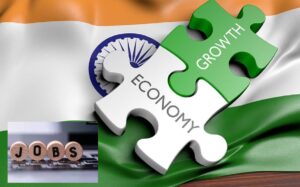5 Economic Challenges Threatening India 7% Growth Dream
India’s dream of 7% growth might face hurdles due to rising interest rates and global uncertainties. The Economic Survey advises a more realistic target of 6.5-7% and highlights the importance of job skills, boosting small businesses, and a smooth transition to clean energy for lasting economic success.
CONTENTS: 5 Economic Challenges Threatening India 7% Growth Dream

Growth slows, support infrastructure, invest strategically
5 Economic Challenges Threatening India 7% Growth Dream
The Economic Survey anticipates GDP growth slowing to 6.5-7% in fiscal 2025, which aligns with CRISIL’s projection of 6.8%. This forecast reflects the economy’s resilience in the first quarter, evidenced by robust PMI figures and strong tax collections.
We maintain our forecast due to expected pressures from high interest rates and diminishing pent-up demand. Additionally, elevated global risks contribute to a downward bias in these projections.
In this uncertain environment, it is prudent for the Budget to continue supporting infrastructure development while fostering an enabling environment to encourage private investment in strategic and job-creating sectors.
Survey: Realistic Growth, Domestic Demand Key
Food inflation remains a significant challenge.
The upcoming Budget will reveal how well it addresses the Economic Survey’s recommendations.
GDP Growth Expectations are Realistic
By Aditi Nayar, Chief Economist, ICRA
5 Economic Challenges Threatening India 7% Growth Dream: The Economic Survey has forecasted GDP growth for FY25 at 6.5-7%, which is conservative compared to market estimates. However, these projections are deemed realistic by ICRA (ICRA estimate: 6.8%) given the uncertainties related to global and agro-climatic conditions. Additionally, the expected reduction in the gap between GDP and GVA growth, influenced by a decrease in subsidies in FY24, suggests slower economic growth for FY25. The impact of elections on certain sectors may temporarily slow growth in the first half of the year, with a potential rebound in the second half.
There is skepticism about sustaining growth above 7% in the medium term, mainly due to concerns about export prospects. Consequently, India’s growth will increasingly depend on domestic demand, highlighting the need for continued job creation.
Survey: Skills, MSMEs, Green Transition
Highlighting Challenges and Potential
By Sunil Kumar Sinha, Senior Director, Ind-Ra
The Economic Survey serves as an annual evaluation of the country’s economic performance. Traditionally, it also includes analysis of challenges and recommendations for short- to medium-term growth prospects. To evaluate the Survey’s effectiveness, it is useful to examine how well it addresses these aspects.
Three key issues to consider are: (i) employment and skill development, (ii) growth and expansion of MSMEs, and (iii) energy transition. These issues are interconnected, and the Survey discusses the challenges in each area. It advocates for a collaborative effort among the government, private sector, and academia to enhance skill development.
The Survey recognizes that MSMEs are hindered by compliance burdens and inadequate access to finance, which impedes their growth. On the topic of energy transition, while it acknowledges India’s ambitious approach, it also highlights the associated trade-offs.
Invest in skills, empower MSMEs, green future
Rajani Sinha, Chief Economist, CareEdge
5 Economic Challenges Threatening India 7% Growth Dream: The Survey effectively highlights crucial areas such as employment generation, labor skilling, agricultural reforms, support for MSMEs, and managing the green transition to sustain India’s economic growth. India benefits from a large working-age population while developed economies face aging populations. The Survey emphasizes the urgent need to leverage India’s demographic dividend through productive job creation. It also notes the potential for India to lead in utilizing AI in the labor market.
Additionally, the Survey addresses the global trend of increasing geopolitical fragmentation and the need for economies to adapt to this changing landscape. It recommends that India’s inflation targeting framework focus on inflation excluding food, a suggestion supported by the fact that food inflation is largely driven by supply-side factors.
Check out TimesWordle.com for all the latest news
You must be logged in to post a comment.